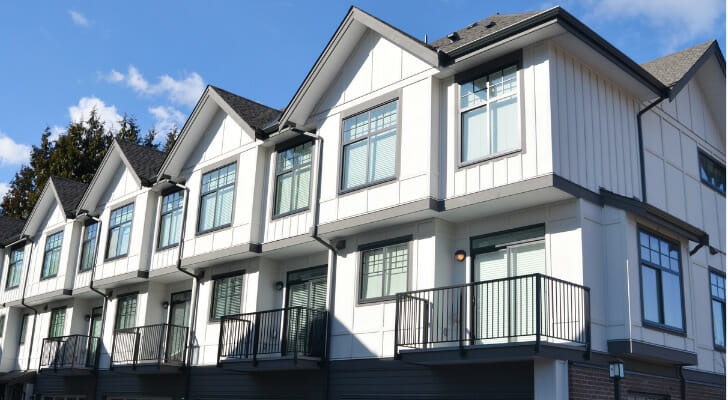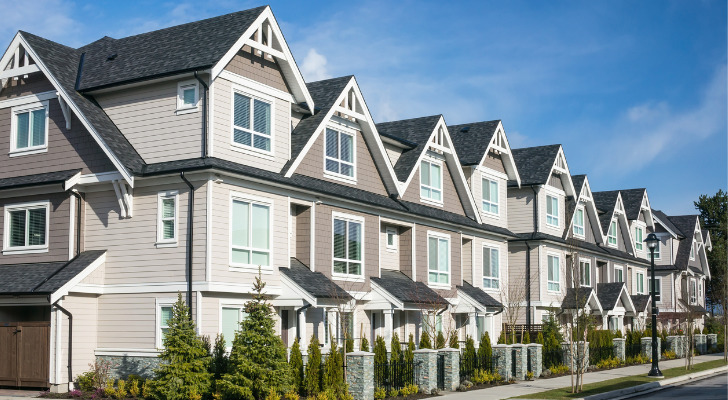Condominiums and townhouses are home types that both appeal to buyers who are looking for simplified maintenance and lower prices than traditional single-family residences. While similar, each has advantages and disadvantages compared to the other. Here are the major differences and tips on how to choose between them. If you’re considering buying any type of home and want to see how it fits into your financial plan, consider working with a financial advisor.
Condo and Townhouse Basics
A condominium is an individual residential unit that is part of a shared communal complex. On the surface, condos often are indistinguishable from apartments in multifamily buildings. The difference is that condos are sold instead of rented. That means you can own your personal unit, while the common areas including lobbies and pools and landscaped areas are jointly owned.
Townhouses are often two stories or more tall and have dedicated entrances in both front and rear. Dwellers in townhouses don’t have neighbors above or below but generally do also share walls with neighbors on both sides. Townhouses buyers own their specific units, while common areas in townhouses developments typically are jointly owned and managed by a homeowner’s association.
Comparing Condos and Townhouses

Condos and townhouses are easily distinguished from traditional detached single-family homes. Both are usually not detached but part of a larger building. They also share ownership and, to differing degrees, maintenance of the exteriors of their units with a homeowner’s association. Still, there also significant differences.
One big difference is that townhouses buyers have legal ownership of both the interior and exterior of their units. Condo owners, on the other hand, typically only own the interior of their units. These differences make for sizable variations in cost, maintenance duties and the control enjoyed by condo and townhouses owners.
Condo associations often provide more services than townhouses associations. Condo owners usually have no individual responsibility for items such as exterior painting, roofing and landscaping. Townhouses owners may have to paint their own unit exteriors and otherwise have higher maintenance costs.
Because they own only the interiors of their units, condo owners are likely to pay lower premiums for hazard insurance. The homeowner’s association will have coverage for the exteriors of the building. However, condo owners are also likely to pay higher homeowner association fees because their homeowner’s associations handle more services such as exterior painting and roof replacement. In addition, condo owners may have more association-provided amenities such as pools and fitness centers than townhouses buyers.
Townhouses are generally somewhat larger in square footage and, therefore, have higher price points than typical condos. However, condos often exhibit more stability in pricing, while townhouses values can more closely track fluctuations in the overall housing market. Greater price stability helps avoid unpleasant surprises if property values drop, but it also means there is less potential for price appreciation with a condo.
Financing the purchase of either of these home types can be more difficult than getting a mortgage for a traditional home. In particular, lenders may require larger down payments than they would for a single-family detached home loan of similar size. And condo buyers may have to make bigger down payments than townhouses buyers.
Condos can come in a wide variety of formats, ranging from units in high-rise downtown residential towers to garden complexes in the suburbs. Townhouses tend to be in smaller buildings two to three stories tall, with separate entrances front and rear. Many are built in rows and called rowhouses in some markets. Townhouses may have small front and back yards and can feel more private than condos.
Both townhouses and condos have to follow rules of varying strictness enforced by homeowners association boards. Among them may be restrictions that limit the owner’s ability to rent the units to other parties. Before buying a condo or a townhouses that you may someday want to rent, check the association bylaws for limits on rentals.
Bottom Line

Townhouses and condos are similar but have significant differences. Townhouses generally have lower homeowner association fees, are easier to finance and offer more square footage and more privacy. They are more similar to traditional detached homes. Condos generally have more stable pricing, require less maintenance and have more amenities and services but have a less private feel.
Tips on Buying a Home
- Any major financial decision can benefit from gaining input from an experienced and qualified financial advisor, who can help you make moves that are consistent with your overall financial strategy. Finding a qualified financial advisor doesn’t have to be hard. SmartAsset’s free tool matches you with up to three financial advisors who serve your area, and you can interview your advisor matches at no cost to decide which one is right for you. If you’re ready to find an advisor who can help you achieve your financial goals, get started now.
- Many types of homes are available for homebuyers in the market for a new residence. In addition to condos and townhouses, buyers can choose from single-family detached homes in formats ranging from single-level suburban ranch-styles to multi-story mansions on large lots. Adding in manufactured homes and tiny homes expands the home buyers options to an even wider ranges of cost and expansiveness.
Photo credit: ©iStock.com/Svetlana123, ©iStock.com/AnthonyRosenberg, ©iStock.com/vkyryl
